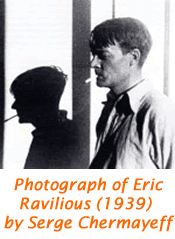I've been enjoying Rob Young's book
Electric Eden, an exhaustive study of the folk tradition in English popular culture over the last century and a bit, from William Morris to Kate Bush, Talk Talk and Julian Cope. I was also pleased to watch a new film by Tony Palmer about Gustav Holst,
In the Bleak Midwinter (still available on
iPlayer, but not for much longer). The two are linked, because Rob Young discusses Holst's role (along with that of Vaughan Williams) in the folk revival of the early 20th century. Both the film and the book also highlight
Thaxted in Essex as a particularly important venue for radicalism - a somewhat surprising history given the village's idyllic and tranquil appearance today.
I'm always pleased to be surprised by some new fact or aspect of a place (or a person) that completely undermines any assumptions or preconceptions that one might have had of it (or them). It was fascinating to discover for example in Tony Palmer's film, that Cheltenham (where Holst was born) had such strong Indian links in the 19th century. It was the place that many members of the Indian Civil Service retired to, so much so that it became known as the town of the 'curry eating colonels'. Holst was to develop a fascination with Indian culture, learning Sanskrit and writing an opera based on an episode in the
Ramayana.
Holst discovered Thaxted in 1913, while on a countryside ramble. He was to spend time in a cottage nearby and later to move permanently to a fine house on the high street. Significantly, he formed an alliance with Thaxted's radical vicar,
Conrad Noel, known as the 'Red Vicar' of Thaxted. Noel was a socialist who 'hung the
red flag and the flag of
Sinn Féin alongside the
flag of St George in the Church' leading to the so-called 'Battle of the Flags', when undergraduates from Cambridge travelled to the Church to tear such visible provocations down.
Together, Holst and Noel created the
Thaxted Whitsun Festival in 1916. Rob Young has a good description:
"Even in the midst of war, the first Whitsun Festival shines out as the moment English music lost its inhibitions and erupted into a cascade of spontaneous music-making. In this remote village, Holst created a four-day temporary autonomous zone, and orgy of colour, music and movement on the village green during which William Morris's desire for an art that would fill all corners of life and spill over into common experience was realised."
There is still a festival that takes place every year, as well as a
Morris weekend in early June that is well worth visiting for the performance of the
Abbot's Bromley Horn Dance.
Holst and Noel were not the only radicals living in this pastoral idyll. Noel had been granted the living by the socialist Daisy Countess of Warwick, owner of nearby
Easton Lodge. Many of the radical figures of the day were regular visitors to Easton Lodge, including George Bernard Shaw and HG Wells, who lived in a house on the estate. Wells based Claverings park in his novel
'Mr Britling Sees it Through' on Easton Lodge, and the opening pages of that book contain a description of this corner of Essex as it was in the early 20th century:
"There is a gap in the suburbs of London. The suburbs of London stretch west and south and even west by north, but to the north-eastward there are no suburbs; instead there is Essex. Essex is not a suburban county; it is a characteristic and individualised county which wins the heart. Between dear Essex and the centre of things lie two great barriers, the East End of London and Epping Forest. Before a train could get to any villadom with a cargo of season-ticket holders it would have to circle about this rescued woodland and travel for twenty unprofitable miles, and so once you are away from the main Great Eastern lines Essex still lives in the peace of the eighteenth century, and London, the modern Babylon, is, like the stars, just a light in the nocturnal sky. In Matching's Easy, as Mr. Britling presently explained to Mr. Direck, there are half-a-dozen old people who have never set eyes on London in their lives—and do not want to."














